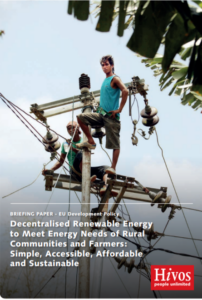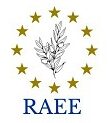Publisher: Hivos

Energy Needs in Rural Areas
One fifth of the world’s population, 1.3 billion people, has no access to electricity. Some 2.6 billion rely on inefficient traditional cooking stoves that emit dangerous fumes. The majority of these people live in poverty, often in remote rural communities. The reduction of inequalities is central to the international development goals; energy access for all must be achieved.
Addressing the needs of rural communities and smallholder farmers is central to this effort, and ensuring access to efficient, clean energy is at the core of the development needs of these communities and farmers, so as to increase rural productivity, provide light for education and to stop indoor air pollution. Decentralized renewable schemes are best suited to generating the energy needs for such communities.
The European Union’s development policy is unambiguously focused on poverty eradication (art 208, TFEU) and Renewable Energy is increasingly recognized as an important element of the development actions. The European Parliament noted with concern that 84% of those without access to modern energy live in rural areas in the poorest areas of the world, such as sub-Saharan Africa and developing Asia:
Providing smallholder farmers and the rural communities in which they live with access to modern energy facilities would help create new economic opportunities related to agricultural products, and enable new businesses to be developed. This would help to reduce migration from these rural areas and reduce pressure on urban areas.
Energy needs of people living in poverty can be met. It requires a decentralized approach to renewable energy that is simple, accessible, affordable and sustainable.
Simple: low technical maintenance
Accessible: to reach the needs in rural and remote areas
Affordable: to low-income households and smallholder farms
Sustainable: to provide a long-term solution and protect natural resources
This briefing paper sets out how EU development cooperation can respond to the energy needs of rural communities through Decentralised Renewable schemes
